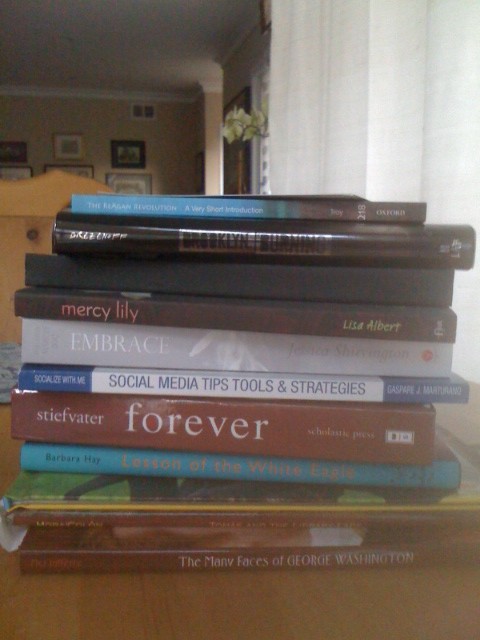I was very fortunate last Thursday to attend UC Davis’s fifth annual Academic Literacy Summit. My attendance was sponsored by Stacey Aldrich, California State Librarian, who funded participation by 10 statewide teacher librarians and 10 public librarians. The summit, with approximately 200 K-16 educators, explored the topic “What’s at the Core of Academic Literacy,” with special focus on the new Common Core Standards. A huge plus of the summit for me was the opportunity to share ideas with educators from multiple grade levels, ranging from elementary school through college.
The opening presentation of the day was a teaching demonstration by Jose Rivas, Physics and Engineering Teacher at Lennox Math, Science, and Technology Academy in Inglewood and a recipient of the Carlston Family Foundation 2011 Outstanding Teacher Award. Rivas was able to both teach us a physics lesson and articulate his techniques as he progressed. He showed us how he builds emotional connections with students to engage them and help them retain material through hands-on exploration, fun competition, self-assessments, and lively film clips. He emphasized how a short movie or song can help students retain an important concept. He spends minimal time doing direct instruction, since the students spend most of their time actively working on solving problems with other students. Our challenge was to use a collection of Styrofoam cups, paper clips, tape, wooden sticks, and rubber bands to create a catapult for a marble that would send the marble further than our other classmates’ examples. We all got into the spirit of the competition, although I am afraid my group’s product was not very successful!
I came away highly motivated to incorporate these techniques in the lessons I teach. I especially liked his effective use of film clips. An audience favorite was the film he made himself in which a picture of Isaac Newton was talking to us. He used a software product called Crazy Talk in order to animate the picture. CrazyTalk is definitely on my “have to get and use” list now! Another example he shared that I think I could implement right away was a tic-tac-toe game. Students receive a sheet of physics computation questions at different levels of difficulty. Once they choose a level with which to begin solving problems, they can find the correct answers on a tic-tac-toe board which they compete with a classmate to complete. I think this tic-tac-toe model could be applied to problems in any subject area, including my own information literacy lessons in the library.
One of the breakout sessions I attended was led by Bill Macauley, Director of the University Writing Center at the University of Nevada, Reno. The intended focus of the session was on how we can help students make the transition from high school writing to college writing. In fact, though, our discussion was much broader, since there were educators from middle school through college participating. We discussed how the Common Core Standards provide a fairly even balance between higher order and lower order skills, and how we can balance them in writing instruction and practice. Macauley shared several handouts on designing effective writing assignments which I can, in turn share with Mira Costa teachers, and we all contributed our own ideas in small group and whole group discussions. One idea that I contributed myself to help students develop both lower order and high level skills is to alternate between structured writing assignments and more free form, creative writing such as blog postings. We also talked about how the teacher librarian can help the students focus on the structure and citation components of writing, while the subject area teacher focuses on the higher order analysis components. Another idea we discussed was the value of using Google Docs for writing assignments, allowing teachers to share comments with students online. One participant suggested taking advantage of the revision history feature and requiring students to articulate the kind of changes they make at each revision.
I attended a second breakout session on “You Can Have it All: Academic Literacy, Critical Thinking, and Student Engagement through the Common Core” led by Nicole Kukrai, Secondary Teacher on Special Assignment, San Juan Unified School District and Area 3 Writing Project. Like Rivas, Kukrai led us in a model lesson, and, at the same time, articulated the techniques or routines she uses to teach students and build a classroom culture of learning. The lesson in this case was reading and analyzing a short essay, We all came away with a number of routines for multiple readings of a text and student conversation promoting academic literacy in the classroom. Kukrai’s routines included “turn and talk” in which students pair up to discuss what they read, small group conversation, whole group sharing, and charting the discussion points. We all read the essay several different times, focusing on different types of questions for each reading. While we worked in pairs and small groups, Kukrai had time to move from group to group, assess our performance, and give help as needed. These routines are definitely good ideas I would like to use as models for my own teaching.
I came away from the summit with lots of good ideas for myself, many I can share with other Mira Costa staff, and a much better understanding of the new Common Core Standards and how I can help implement them. Teachers, please come by to hear more about the summit and see the helpful handouts I received. I am very grateful to have been able to attend this outstanding professional development day.





